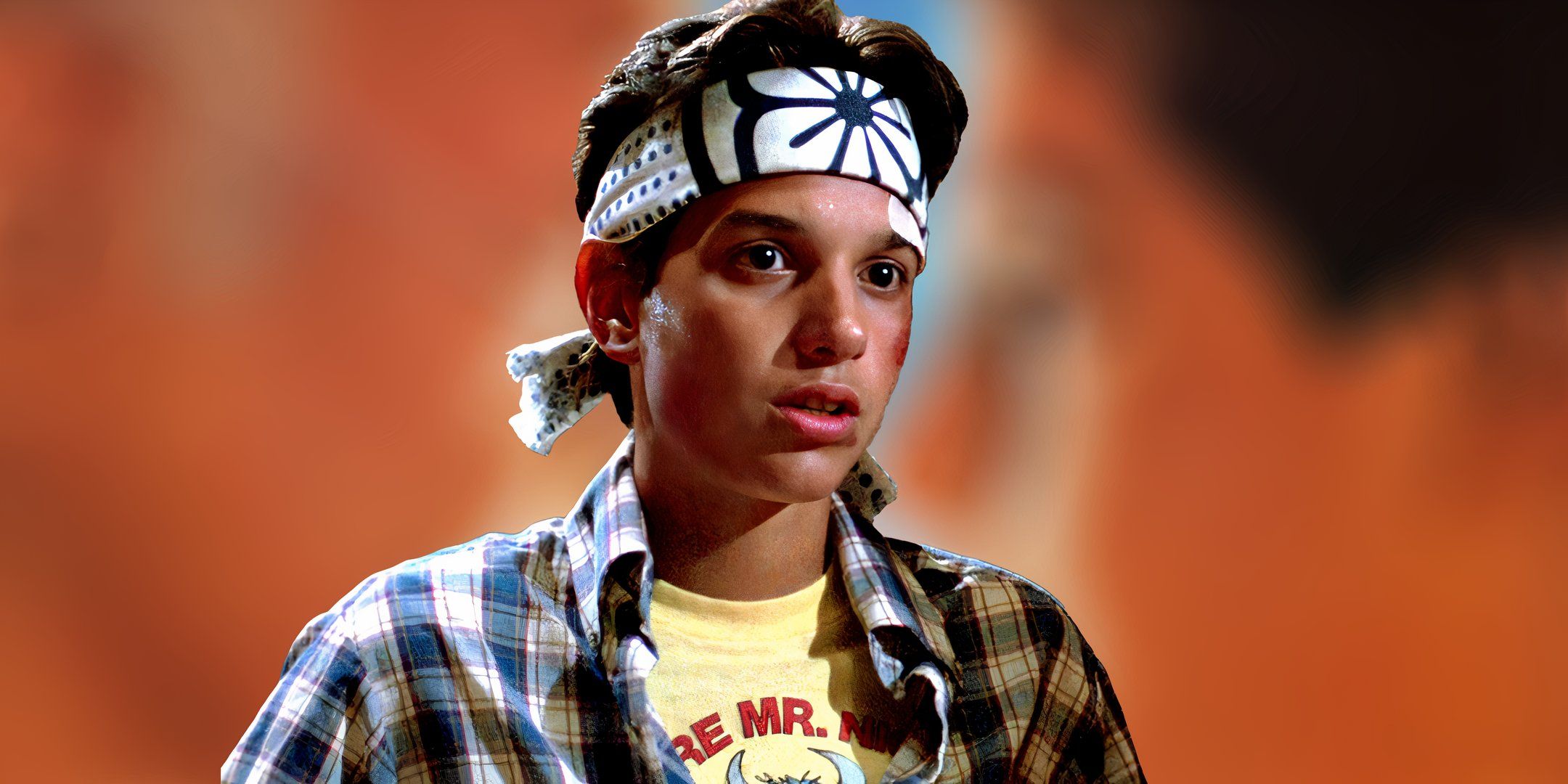Following the success of Sylvester Stallone’s Rocky, one of the biggest trends of the 1980s became underdog sports stories, with one of the more iconic being The Karate Kid. Helmed by original Rocky director John G. Avildsen, the 1984 teen drama not only became one of the biggest hits of its year, but also spawned a franchise that is still going to this day, including two direct sequels and the Netflix TV show Cobra Kai, which has served as a legacy sequel to the original movies.
The Karate Kid starred Ralph Macchio as Daniel LaRusso, a 17-year-old who moves from New Jersey to California with his mother and struggles to adjust to his new life and high school. He becomes the target for a group of teenagers that study at the Cobra Kai dojo under the ruthless John Kreese. Daniel ultimately finds both comfort and a friend in the form of his apartment complex’s eccentric handyman, Mr. Miyagi, who agrees to train him in karate, though with a unique set of chores and only as long as he maintains the mentality of using it for defense.
The Karate Kid’s Underdog Story Remains A Crowdpleaser
Staying true to the Rocky formula makes the plot largely predictable, but still enjoyable
The concept of an unexpected star rising through the ranks of a sport with the help of a devoted trainer was not a new concept, even by the time Rocky came along, though it had often been used for more comedic effect, such as with Slap Shot, The Longest Yard and The Bad News Bears. Regardless of their varying tones, the subgenre did largely stick to the same formula, bringing their respective protagonists victory in some form or other.
Despite the familiarity, though, it’s hard to deny the crowdpleasing nature of The Karate Kid‘s story.
With The Karate Kid, writer Robert Mark Kamen does stick a little too closely to the formula for the movie to be completely original. Daniel’s improvement of his karate skills is appropriately gradual, but isn’t without the expected montages to make progress a little quicker. Even his rise through the tournament itself stays true to the underdog format. Daniel easily beats his first few opponents, then has a few hits land on him before ultimately winning the fights.
Despite the familiarity, though, it’s hard to deny the crowdpleasing nature of The Karate Kid‘s story. Macchio’s performance as Daniel is full of life and emotion, which makes it easy for us to want to see him succeed in the tournament. The dedicated support from Daniel’s mom, his love interest Ali and Mr. Miyagi also gives Macchio’s protagonist all the more reason to want to win and prove himself.
Some Of The Karate Kid’s Characters Are Underdeveloped
The focus on Daniel leaves us wanting more from those around him
While his connections to these characters may be part of why we want to root for him, The Karate Kid‘s supporting characters struggle to be fully realized people. Elisabeth Shue’s Ali largely exists to support Daniel, even as the movie makes the occasional attempt to highlight her desire to break free from her upper-class family and friends’ judgment to love him. One of the more notable instances of this underwhelming character work is how quickly she forgives Daniel after he gets cocky about his new car from Mr. Miyagi.
it would have been nice to see Morita be given a more in-depth role from the get-go.
William Zabka’s Johnny Lawrence is another notable Karate Kid character who is woefully underdeveloped as the movie progresses. Even without the knowledge of Cobra Kai putting Johnny on a path of redemption, the movie offers a few hints at him being more than just the atypical bully, clearly hurt by being spurned by Ali and lacking the right behavior to get a second chance with her. Even after all the animosity between them, Johnny congratulating Daniel at the end and telling him he’s alright proves there was far more of his character to explore.
One of the biggest characters who needed more focus was Pat Morita’s Mr. Miyagi. Between Daniel being the protagonist and playing up the mystic POC mentor trope that has been featured in countless movies, Miyagi is largely an enigma, with only a handful of mentions of his father teaching him some of the things he teaches Daniel, and a heartbreaking scene in which he relives the death of his wife and son. While later franchise installments would start to reveal more about him, it would have been nice to see Morita be given a more in-depth role from the get-go.
The Karate Kid’s Humor Ages Surprisingly Well
Avoiding any outright dated jokes helps The Karate Kid mostly hold up
After 40 years, The Karate Kid‘s script and humor ages very well. Despite the era being rife with movies targeting everything from race to sexuality for low-brow jokes, Kamen largely treats the central Asian character with respect by avoiding too many major stereotypes and racist characters. Even Johnny and Kreese’s various threats against Johnny and Miyagi aren’t offensive, just appropriately sinister.
Overall, The Karate Kid certainly has some flaws that become easier to recognize with time and when viewing the movie from a macro perspective, but it still largely overcomes them to remain an underdog sports classic. Macchio and Morita not only deliver outstanding individual performances, but also show a remarkable chemistry with one another, and Martin Kove’s performance as Kreese remains an effectively chilling foil to the film’s leads. With a new Karate Kid movie releasing in May 2025 and Cobra Kai restoring the franchise’s win streak, one can hope the former continues to pull the right lessons.

